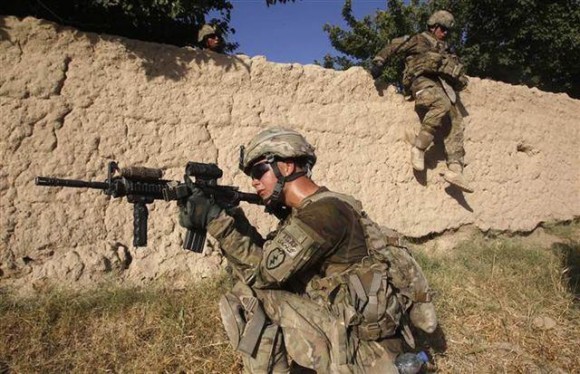
Obama’s strategic pivot to Asia has been hamstrung by hard facts. Sequestration included cuts to the defense budget that officials say handicapped the planned military surge in East Asia. The Syrian civil war, nuclear negotiations with Iran, and efforts to get Israeli and Palestinian leaders back to the table have drawn the U.S. back into the quicksand of the Middle East. And the October government shutdown led Obama to cancel a trip to Southeast Asia, in what was widely regarded as a diplomatic victory for China.
Don’t play your violins just yet. President Obama’s Asia-Pivot is essentially a military surge throughout East Asia meant to threaten and therefore contain a rising China. Does China threaten U.S. security? No. But expansionist U.S. policies in Asia to maintain hegemony over the world do threaten to provoke conflict between China and it’s U.S.-backed neighbors.
In addition to the above-mentioned roadblocks to a successful Asia-Pivot implementation, Ely Ratner of the Center for a New American Security is worried about another hinderance to U.S. imperialism – namely, popular opposition.
U.S. policymakers need to remember that foreign governments permitting the access and presence of U.S. troops and military equipment are engaging in highly politicized acts that can evoke deeply rooted nationalist sentiments associated with sovereignty, independence and, in some cases, colonialism and occupation. This has been manifest in America’s modern experience in the region. The Philippine Senate expelled U.S. forces from Subic Bay and Clark Air Force Base shortly after the end of the Cold War. Accidents and incidents associated with U.S. bases in Japan and South Korea have also created public outcry and led to painstaking negotiations to realign U.S. forces. More recently, in 2009 leaders from the newly elected Democratic Party of Japan sought domestic political advantage by undoing plans to relocate Futenma Air Station on Okinawa. The issue to this day remains a thorn in the side of the alliance.
For Washington and it’s helpful D.C. policy wonks, the task is not to acknowledge and respect the fact that foreign populations don’t want to be occupied by a non-native military. Instead, the task is to figure out how to get around this inconvenient obstruction.
This is why the humanitarian disaster following the Philippine typhoon is so politicized. Washington intends to give $20 million in relief and the U.S. military arrived quickly to assist in emergency relief operations. In contrast, China is sending less than $2 million in relief and has been much less visible. Washington is exploiting the humanitarian crisis in order to make U.S. military presence more palatable.
In the aftermath of 9/11, the phenomenon of “blowback” received a lot of focus. The Muslim world, especially militant Islamist groups, are infuriated by U.S. military presence in their lands and the bribing of unrepresentative governments that comes along with it. As it turns out, the costs of blowback, which manifest in events like 9/11, were well worth it to grand strategists in Washington, who expanded their presence and increased their interventionism in response to the attacks.
Incidentally, it was “blowback” in the Asian countries occupied by the U.S. that was first popularized. In 2000, Asia policy expert and professor at the University of California Chalmers Johnson, who also fought in the Korean war and was a consultant for the CIA, published a book called Blowback: The Costs and Consequences of American Empire and largely focused on the popular opposition to U.S. military presence in Asia. After 9/11, he became the go-to expert on blowback.
The U.S. government will do whatever it takes to continue to expand into Asia and wage a cold war with China, so long as it is possible to gain net benefits vis-à-vis its own geopolitical power. If Asian populations don’t like it, too bad. If Americans are hated for it, no problem. As Chalmers Johnson taught us, those are seen as acceptable costs and consequences of Empire.






